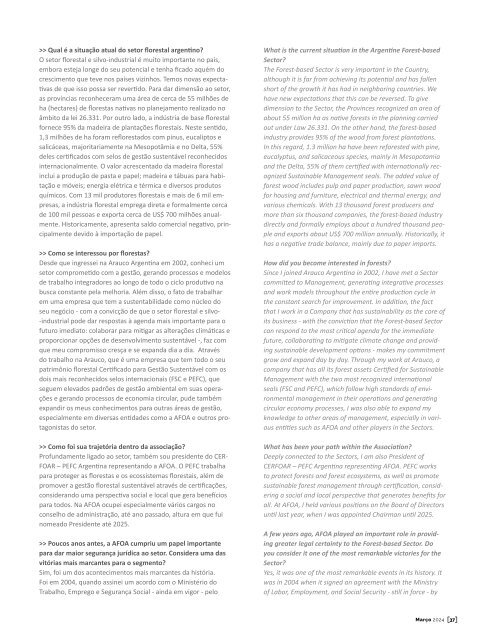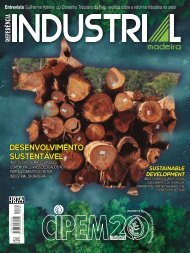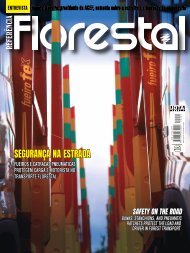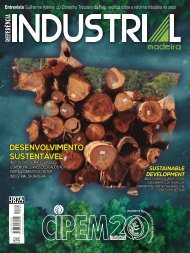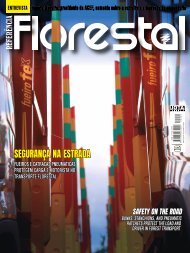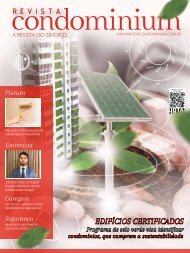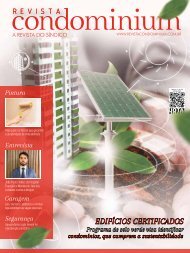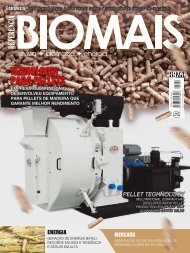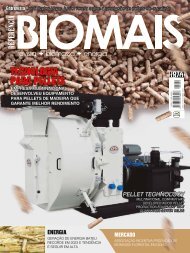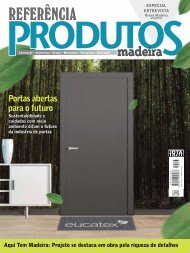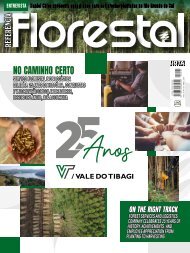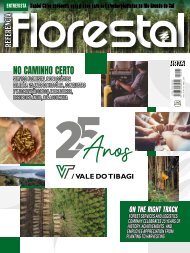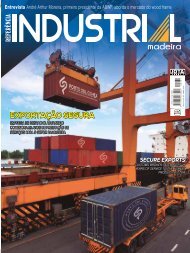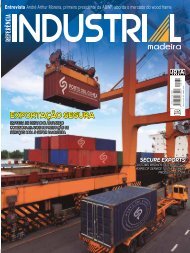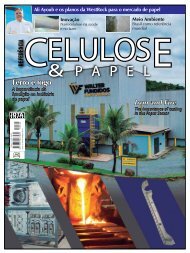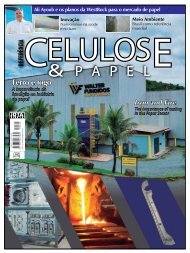Create successful ePaper yourself
Turn your PDF publications into a flip-book with our unique Google optimized e-Paper software.
Qual é a situação atual do setor florestal argentino?<br />
O setor florestal e silvo-industrial é muito importante no país,<br />
embora esteja longe do seu potencial e tenha ficado aquém do<br />
crescimento que teve nos países vizinhos. Temos novas expectativas<br />
de que isso possa ser revertido. Para dar dimensão ao setor,<br />
as províncias reconheceram uma área de cerca de 55 milhões de<br />
ha (hectares) de florestas nativas no planejamento realizado no<br />
âmbito da lei 26.331. Por outro lado, a indústria de base florestal<br />
fornece 95% da madeira de plantações florestais. Neste sentido,<br />
1,3 milhões de ha foram reflorestados com pinus, eucaliptos e<br />
salicáceas, majoritariamente na Mesopotâmia e no Delta, 55%<br />
deles certificados com selos de gestão sustentável reconhecidos<br />
internacionalmente. O valor acrescentado da madeira florestal<br />
inclui a produção de pasta e papel; madeira e tábuas para habitação<br />
e móveis; energia elétrica e térmica e diversos produtos<br />
químicos. Com 13 mil produtores florestais e mais de 6 mil empresas,<br />
a indústria florestal emprega direta e formalmente cerca<br />
de 100 mil pessoas e exporta cerca de US$ 700 milhões anualmente.<br />
Historicamente, apresenta saldo comercial negativo, principalmente<br />
devido à importação de papel.<br />
>> Como se interessou por florestas?<br />
Desde que ingressei na Arauco Argentina em 2002, conheci um<br />
setor comprometido com a gestão, gerando processos e modelos<br />
de trabalho integradores ao longo de todo o ciclo produtivo na<br />
busca constante pela melhoria. Além disso, o fato de trabalhar<br />
em uma empresa que tem a sustentabilidade como núcleo do<br />
seu negócio - com a convicção de que o setor florestal e silvo-<br />
-industrial pode dar respostas à agenda mais importante para o<br />
futuro imediato: colaborar para mitigar as alterações climáticas e<br />
proporcionar opções de desenvolvimento sustentável -, faz com<br />
que meu compromisso cresça e se expanda dia a dia. Através<br />
do trabalho na Arauco, que é uma empresa que tem todo o seu<br />
patrimônio florestal Certificado para Gestão Sustentável com os<br />
dois mais reconhecidos selos internacionais (FSC e PEFC), que<br />
seguem elevados padrões de gestão ambiental em suas operações<br />
e gerando processos de economia circular, pude também<br />
expandir os meus conhecimentos para outras áreas de gestão,<br />
especialmente em diversas entidades como a AFOA e outros protagonistas<br />
do setor.<br />
>> Como foi sua trajetória dentro da associação?<br />
Profundamente ligado ao setor, também sou presidente do CER-<br />
FOAR – PEFC Argentina representando a AFOA. O PEFC trabalha<br />
para proteger as florestas e os ecossistemas florestais, além de<br />
promover a gestão florestal sustentável através de certificações,<br />
considerando uma perspectiva social e local que gera benefícios<br />
para todos. Na AFOA ocupei especialmente vários cargos no<br />
conselho de administração, até ano passado, altura em que fui<br />
nomeado Presidente até 2025.<br />
>> Poucos anos antes, a AFOA cumpriu um papel importante<br />
para dar maior segurança jurídica ao setor. Considera uma das<br />
vitórias mais marcantes para o segmento?<br />
Sim, foi um dos acontecimentos mais marcantes da história.<br />
Foi em 2004, quando assinei um acordo com o Ministério do<br />
Trabalho, Emprego e Segurança Social - ainda em vigor - pelo<br />
What is the current situation in the Argentine Forest-based<br />
Sector?<br />
The Forest-based Sector is very important in the Country,<br />
although it is far from achieving its potential and has fallen<br />
short of the growth it has had in neighboring countries. We<br />
have new expectations that this can be reversed. To give<br />
dimension to the Sector, the Provinces recognized an area of<br />
about 55 million ha as native forests in the planning carried<br />
out under Law 26.331. On the other hand, the forest-based<br />
industry provides 95% of the wood from forest plantations.<br />
In this regard, 1.3 million ha have been reforested with pine,<br />
eucalyptus, and salicaceous species, mainly in Mesopotamia<br />
and the Delta, 55% of them certified with internationally recognized<br />
Sustainable Management seals. The added value of<br />
forest wood includes pulp and paper production, sawn wood<br />
for housing and furniture, electrical and thermal energy, and<br />
various chemicals. With 13 thousand forest producers and<br />
more than six thousand companies, the forest-based industry<br />
directly and formally employs about a hundred thousand people<br />
and exports about US$ 700 million annually. Historically, it<br />
has a negative trade balance, mainly due to paper imports.<br />
How did you become interested in forests?<br />
Since I joined Arauco Argentina in 2002, I have met a Sector<br />
committed to Management, generating integrative processes<br />
and work models throughout the entire production cycle in<br />
the constant search for improvement. In addition, the fact<br />
that I work in a Company that has sustainability as the core of<br />
its business - with the conviction that the Forest-based Sector<br />
can respond to the most critical agenda for the immediate<br />
future, collaborating to mitigate climate change and providing<br />
sustainable development options - makes my commitment<br />
grow and expand day by day. Through my work at Arauco, a<br />
company that has all its forest assets Certified for Sustainable<br />
Management with the two most recognized international<br />
seals (FSC and PEFC), which follow high standards of environmental<br />
management in their operations and generating<br />
circular economy processes, I was also able to expand my<br />
knowledge to other areas of management, especially in various<br />
entities such as AFOA and other players in the Sectors.<br />
What has been your path within the Association?<br />
Deeply connected to the Sectors, I am also President of<br />
CERFOAR – PEFC Argentina representing AFOA. PEFC works<br />
to protect forests and forest ecosystems, as well as promote<br />
sustainable forest management through certification, considering<br />
a social and local perspective that generates benefits for<br />
all. At AFOA, I held various positions on the Board of Directors<br />
until last year, when I was appointed Chairman until 2025.<br />
A few years ago, AFOA played an important role in providing<br />
greater legal certainty to the Forest-based Sector. Do<br />
you consider it one of the most remarkable victories for the<br />
Sector?<br />
Yes, it was one of the most remarkable events in its history. It<br />
was in 2004 when it signed an agreement with the Ministry<br />
of Labor, Employment, and Social Security - still in force - by<br />
Março 2024<br />
37


